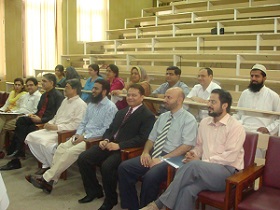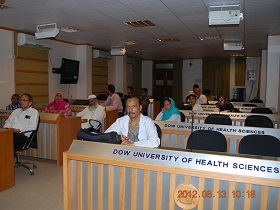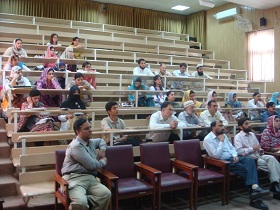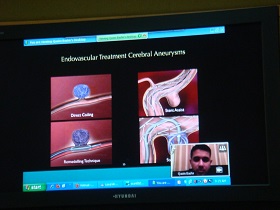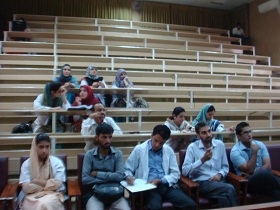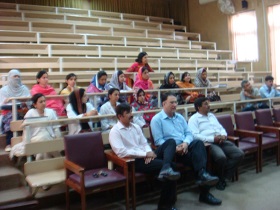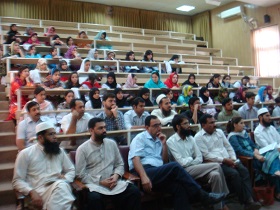APPNA MERIT organizes quality lectures on various topics by Doctors abroad. These lectures are delivered online, and many medical universities from Pakistan participate with full enthusiasm. The number of universities is still increasing weekly. Many lessons have been offered on Dermatology, Neurology, Anaesthesiology, and many more. Doctors from participating universities find these lectures very informative and exciting. We are committed to continuing to give this great opportunity to doctors and medical students in Pakistan.
APPNA MERIT – Ten-Year Journey
In 2006 an ad-hoc education initiative was undertaken to complement and enhance Health care in Pakistan. The Medical Education and Research Investment Task force (MERIT) came into being. Dr. Naheed Usmani and Dr. Shahid Rafiq are the founding Chair and founding member respectively with support from Dr. Nadeem Kazi. Dr. Shahid Rafiq (MERIT chair 2017) is the first chair of Neurology Net. This task force became a full standing committee of APPNA as MERIT (Medical Education and Research, International Training and Transfer of Technology) in 2007. Following are the highlights of its success story.
- December 2006 APPNA winter meeting in Pakistan. The members of MERIT task force met with medical education Leadership in Pakistan for a Diagnostic Phase.
- January to June 2007: A series of meeting continued in early part of 2007 with VC of medical universities, Principal of Medical colleges and Post graduate institutes as well as leaders of HEC, CPSP, PMDC, and Federal Ministry of Labor’s National Talent Pool VEPCON program.
- July to December 2007: In light of the feedback obtained from various needs from Pakistan, main programs were structured and organized.
- APPNA visiting faculty program was the initial pinnacle program to boost the center of excellence in Pakistan and CME Webinar live lecture program. Dozens of US faculty visited Pakistan in 2008 to teach at DHUS and other universities. However due to laborious red tape process of VEPCON many who applied had difficulty setting up their visits to Pakistan.
- In Fall of 2007 APPNA Sukoon (APPNA Palliative and Hospice Care Educational Program) was established. In December 2007 Palliative care conference was held in Karachi. In 2008 APPNA MERIT endorsed the INCTR clinical guidelines for Palliative care in low resource countries. Following years many of the leadership in SKMCH, INMOL and Children Hospital Lahore collaborated with MERIT.
- Specialty- Specific MERITNETs. In 2008 specialty based focus effort was launched. Initial MERITNETs were Neurology, Dermatology, Anesthesia and Critical care.
- Medical Curriculum Reforms: In 2008 KEMKANA President invited MERIT to KEMU to start dialogue in this important initiative. December 2008 a day long curriculum reform Colloquium was arranged. KEMU VC Dr. Zafar Ullah Khan and the local and US faculty brainstormed on various aspects of the curriculum reforms. The establishment of medical education department in KEMU and other medical colleges followed this.
- New Fellowships in ER, Critical care and Pediatrics Hematology Oncology: Dow University VC Dr. Masood Hameed Khan was instrumental in these APPNA MERIT initiatives at Dow U. MERIT members worked with CPSP and finally got all three fellowships approved in summer of 2009.
- APPNA MERIT E- Teaching Initiative: Spring meeting 2009 in Dallas saw this project started with IT company of APPNA member Jamal Mubarak and pilot program was presented at Summer meeting in San Francisco 2009 by Neurology MERITNET E Conference organized by Dr. Shahid Rafiq. This was followed by a vast IT infrastructure, which supported twice weakly live lectures from US faculty to Pakistan medical institutions in various medical disciplines. This continued till 2011 when the annual budget of APPNA MERIT for this endeavor ballooned and became unsustainable. At that point Drs. Baber Rao took over as Chair and Shahid Rafiq as Co chair APPNA MERIT and restructured the once weakly live lectures, which are going on since then successfully.
- APPNA MERIT Telemedicine Initiative: Some of earlier efforts were taken in 2007 to train Lady health visitors using ICT based Tele health care in rural Mardan. This was followed by Dermatology tele medicine initiative by Dr. Khaleel Kahtri. In 2015 under APPNA President Dr. Mubashir Rana, Dr. Naheed Usmani started a task force and developed a network of over 200 US consultants to provide consultation for Pakistani physicians through a secure Web based network. In 2017 Telemedicine has taken a full circle and has re joined APPNA MERIT.
- Child Psychiatry initiatives: In the year 2015, College of Physicians and Surgeons Pakistan (CPSP) has approved the Child Psychiatry Fellowship (FCPS) in Pakistan recently. Waqar Azeem Yale faculty at the time and APPNA MERIT team members along with their colleagues in Pakistan, USA and UK have played a key role in developing this fellowship. Pakistan is one of the first countries in Asia, which has a child psychiatry fellowship at National level based on US model of 2 year training in child psychiatry after finishing training in general psychiatry for 4 years. This of course cannot cater to enormous need of children with psychological disorders in Pakistan. Thus Dr. Azeem has collaborated with Dow University and has developed a one-year certification program for adult psychiatrist delivered through MERIT webinars starting summer of 2017.
- APPNA MERIT is collaborating with Pakistan Psychiatric Society (PPS) on various educational and training issues and many of the speakers have collaborated with physicians in Pakistan and published articles
- APPNA MERIT organized a career-planning program for female medical students in Pakistan. This program was developed in collaboration with the US-Pakistan Women’s Council.
Please click on the links below to play videos:
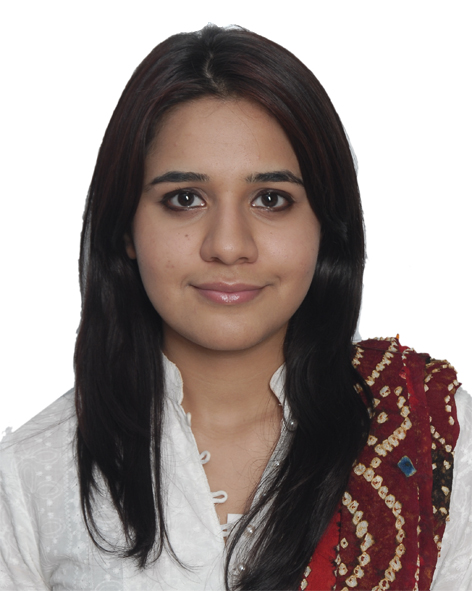 Career Guidance for Female Medical Graduates in Pakistan- A New Initiative
Career Guidance for Female Medical Graduates in Pakistan- A New Initiative
By Mahin Alamgir, MD
The author is a recent graduate of Aga Khan Medical University, Karachi and is a member of APPNA Merit Planning Committee for this project.
Pakistan’s health system faces a unique challenge. In the country’s medical schools, the student body is comprised of a majority of female students, all selected through a merit-based system. According to The Associated Press, this number is as high as 85%. However, due to complex reasons, only as few as a third of female students who graduate actually practice medicine. Of the 24,000 specialist physicians practicing in the country, only 7,000 are female. The result is a dearth of practicing doctors, with myriad negative effects on the health system and the general public. Medical schools in Pakistan are subsidised, which means that government investment into education is not being realized into delivery of health care to the public. And in a country where many women and children still cannot see a male physician for cultural reasons, the shortage of female doctors has a severe impact on this underserved population.
In a country known for its low literacy rates, the overwhelming female presence in medical schools is a heartening change. Ifmore of these graduates go on to practice medicine and contribute to the improvement of the country’s health system, the change would be monumental. As more Pakistanis become educated and economically secure, and health care is availablewhere it’s needed, human development will leap forward.Helping female medical students find a way to practice medicine after they graduate will not only help alleviate the dire shortage of practicing physicians in Pakistan, but also empower women economically, help traditional gender roles evolve, encourage future physicians to follow in their path, and translate into betterhealth care for the general public.
The issue is multilayered. Its roots lie within traditional gender roles still factoring into what decisions can be made by womenabout their future and careers. But there’s more to it. Female doctors in Pakistan suffer from insufficient career guidance and mentoring, lack of career planning resources and lack ofawareness of non-traditional career paths. They have less ability to network with peers due to family limitations. Additionally,factors such as low pay, poor workplace security and a lack of family-friendly policies in make it difficult for young women to work in hospitals.
In Pakistan’s top medical schools, there isn’t enough focus on career guidance. Some colleges provide career guidance as part of the curriculum, but even then, there is no mentoring targeted towards females students to address the issues that hold them back or offer pragmatic choices for professional advancement. Moreover, in my experience, much of the career guidance offered was focused on practicing in the United States, not Pakistan.
APPNA has recently collaborated with the US-Pakistan Women’s Council to come up with a plan to encourage greater female contribution to Pakistan’s health system. Under the leadership of President Dr. Asif Rehman, APPNA Merit Chair Dr. Babar Rao, and Director of the US-Pakistan Women’s Council Sarah Peck, developed a career planning program. Ex-Presidents Saima Zafar and Javed Suleman have promised their support to helping this important program achieve its goals.
Here’s a preview of what APPNA is doing. The MERIT program will begin a series of career counseling lectures, which will be broadcast to medical students in Pakistan. The APPNA website will host a page dedicated to this project, which willprovide profiles of female physicians and offer specific careerguidance, such as entrepreneurship tips for physicians wanting to branch out into private practice. APPNA will work with medical universities to host career guidance seminars for students. Efforts to involve the families of students in these activities will be made. And male students will be welcome.
APPNA is now seeking volunteers to support this project. We are looking for practicing female physicians in the U.S. and Pakistan who can speak in the MERIT program or at career planning seminars in medical schools across Pakistan. Male physicians are also welcome to speak (and write) about career practice tips, especially in non-traditional practice areas that might be suitable for women. APPNA family members can help, too, such as by drafting career guidance materials, writing profiles of female physicians, and administering a Facebook page for this project.
Please contact Dr. Babar Rao via email: babarrao@gmail.com or at 212-949-2516.
Babar Rao, MD
Email: appnamerit@gmail.com
Danyal Rao, MD
Email: raodanyal@gmail.com

